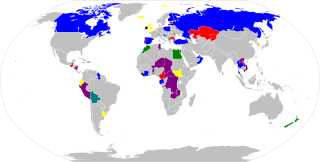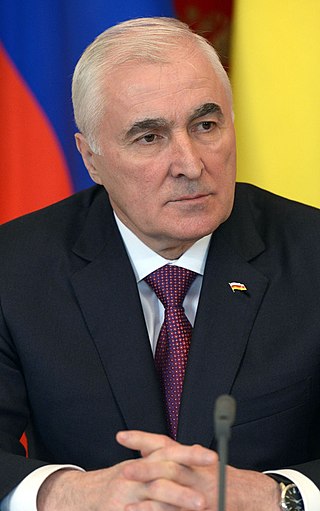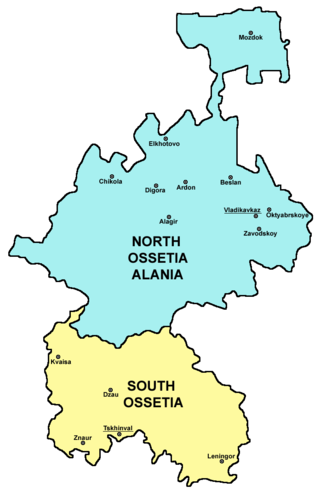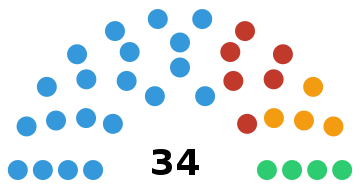
South Ossetia, officially the Republic of South Ossetia – the State of Alania, is a partially recognised landlocked state in the South Caucasus. It has an officially stated population of just over 56,500 people (2022), who live in an area of 3,900 square kilometres (1,500 sq mi), on the south side of the Greater Caucasus mountain range, with 33,000 living in the capital city, Tskhinvali. Only Russia, Venezuela, Nicaragua, Nauru, and Syria recognise South Ossetia as a sovereign state. Although Georgia does not control South Ossetia, the Georgian government and the United Nations consider the territory part of Georgia.

The Georgian–Ossetian conflict is an ethno-political conflict over Georgia's former autonomous region of South Ossetia, which evolved in 1989 and developed into a war. Despite a declared ceasefire and numerous peace efforts, the conflict remained unresolved. In August 2008, military tensions and clashes between Georgia and South Ossetian separatists erupted into the Russo-Georgian War. Since then, South Ossetia has been under Russian occupation.

The president of the Republic of South Ossetia is the de facto head of state of the partially recognized Republic of South Ossetia that is de jure part of Georgia. This is a list of the de facto presidents of the Republic of South Ossetia and the holders of the precursor to the office.

The Communist Party of South Ossetia is a communist party in South Ossetia. The party was founded in 1993. As of 2004, the party claimed a membership of 1,500. The party seeks recognition of the Republic of South Ossetia, which is considered by most countries as part of Georgia

Parliamentary elections were held in South Ossetia on 31 May 2009. The result was a victory for the ruling Unity Party, which won seventeen of the 34 seats. Two opposition parties were not permitted to run out of concern that they might not be loyal to President Eduard Kokoity.

The Parliament of South Ossetia is the unicameral legislature of the partially recognized Republic of South Ossetia. The 34 members of parliament are elected using a mixed system of Party-list proportional representation (17) and single-member districts (17). South Ossetia has a multi-party system, and currently 5 political parties are represented in parliament and has 6 independent MPs elected through single-member districts. The parliament is headed by a speaker, who is elected from among the members. Since 15 september 2022 the speaker of parliament is Alan Alborov, one of the four deputees of the Nykhaz party of president Alan Gagloev, after Alan Tadtaev of United Ossetia was forced to resign.

South Ossetia elects on the national level a head of state—the President—and a legislature. The president is elected for a five-year term by the people. The Parliament of South Ossetia has 34 members, elected for a five-year term using party-list proportional representation.

This national electoral calendar for 2011 lists the national/federal elections held in 2011 in all sovereign states and their dependent territories. By-elections are excluded, though national referendums are included.

Presidential elections were held in South Ossetia on 13 November 2011. A referendum was held on the same day. A run-off was held on 27 November, but the result were invalidated by the Supreme Court of South Ossetia. A new election was scheduled for 25 March 2012.

This national electoral calendar for 2012 lists the national/federal elections held in 2012 in all sovereign states and their dependent territories. By-elections are excluded, though national referendums are included.

Anatoly Ilyich Bibilov is a Russian and South Ossetian military officer, was the 4th President of South Ossetia. He succeeded Leonid Tibilov as president on 21 April 2017 to 24 May 2022, following his election victory, but was defeated by Alan Gagloev in the 2022 election.

Presidential elections were held in South Ossetia on 25 March 2012, with a second round on 8 April. The election selected the first president since the country gained partial international recognition.

Leonid Kharitonovich Tibilov is a South Ossetian politician who served as the President of South Ossetia from 2012 to 2017 after winning the 2012 South Ossetian presidential election.

Russian-occupied territories in Georgia are areas of Georgia that have been occupied by Russia after the Russo-Georgian War in 2008. They consist of the regions of Autonomous Republic of Abkhazia and the former South Ossetian Autonomous Region of Soviet Georgia, whose status is a matter of international dispute.

Presidential elections were held in South Ossetia on 9 April 2017 alongside a referendum on changing the official name of the state to "Republic of South Ossetia–the State of Alania", or "South Ossetia–Alania" for short. Incumbent President Leonid Tibilov ran for a second and final term in office, but was defeated by Anatoly Bibilov of the United Ossetia party.

Parliamentary elections were held in South Ossetia on 9 June 2019.

Presidential elections were held in the disputed territory of South Ossetia on 10 April 2022. As none of the presidential nominees obtained at least 50% of the votes, a runoff was held on 8 May 2022, between the top two candidates, Alan Gagloyev and incumbent president Anatoly Bibilov.

South Ossetia is a partially recognized and Russian-occupied separatist state internationally recognized as part of Georgia. It is mainly inhabited by Ossetians, an ethnic group also dominant in North Ossetia, which is part of Russia. South Ossetia separated itself from Georgia following the 1991–1992 South Ossetia War with the help of Russia, remaining ever since as a state closely allied with this country.

David Georgievich Sanakoev is a South Ossetian political and public figure. He has served as chairman of two different South Ossetian political parties and as President Leonid Tibilov's Minister of Foreign Affairs.
New Ossetia was a minor political party that existed in the partially recognized Caucasian republic of South Ossetia following the 2012 South Ossetian presidential election to its merger into Nykhaz for the 2019 South Ossetian parliamentary election.













